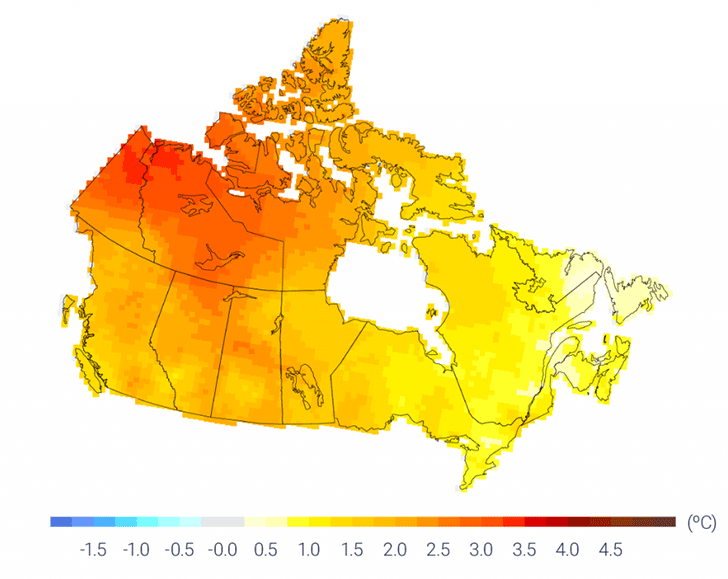You are here
Canada’s Changing Climate Report Released
The Government of Canada released a new report today that details how Canada’s climate has changed in the recent past, how it is likely to change in the future, and how these changes fit within the global context of anthropogenic climate change. Titled, Canada’s Changing Climate Report (CCCR), it explores the changes that Canada has seen, drawing on data from the recent past and climate model projections for the middle and end of the current century.
 |
| This figure, from the CCCR, shows the observed changes in annual average temperature between 1948 and 2016. Image credit: Environment and Climate Change Canada. |
Some key findings of the report are as follows. Canada’s climate has warmed by about 1.7 °C over the 1948-2016 period (see figure), roughly double the global rate, due to human influences. This warming is greater over the winter season and in Northern Canada, where warming is occurring at about three times the global rate. Further warming is inevitable and dependent on global greenhouse gas emissions. Warming is causing increases in heat extremes and decreases in cold extremes. This warming will increase the severity of heat waves and affect both droughts and heatwaves. Smaller snowpacks, declining glacier ice and warmer surface temperatures may reduce freshwater availability during the summer. Precipitation is projected to increase across most of the country, with an overall shift toward less snow and more rain. As the oceans warm, sea level continues to rise and ocean oxygen levels decrease. Simultaneously, atmospheric carbon dioxide continues to be taken up by the ocean, increasing ocean acidification. Sea-ice-free conditions in the Arctic and Atlantic oceans are expected to increase in duration and extent. The magnitude of all of these changes is dependent on anthropogenic greenhouse gas emissions: greater emissions lead to greater projected changes and potential impacts, while emitting less greenhouse gasses leads to smaller projected changes and impacts.
The report was a collaborative effort, drawing on expertise from Environment and Climate Change Canada, Fisheries and Oceans Canada, Natural Resources Canada and scientists from Canadian universities. Former PCIC researchers Alex Cannon and Megan Kirchmeier-Young were chapter co-authors on the report. It is part of an ongoing national assessment, Canada in a Changing Climate: Advancing Our Knowledge for Action that will result in several reports over the next four years, covering the basic science, national issues, regional implications and health implications of the changing climate.
The report is freely available online, here.
More information on Canada in a Changing Climate can be found here.


 Twitter
Twitter Facebook
Facebook Google
Google LinkedIn
LinkedIn